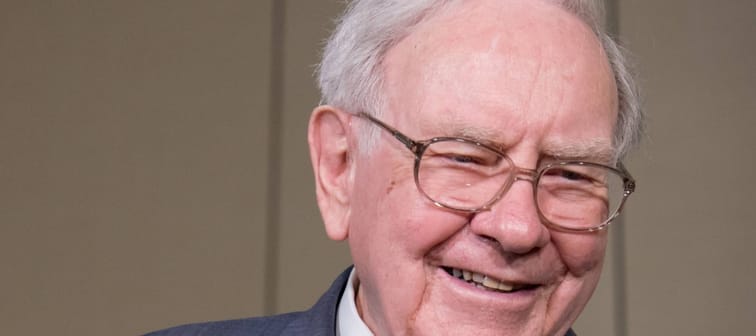High returns, low fees
This decade-long bet challenged the notion that complex and expensive investment methods always yield the best results.
After all, anyone can replicate Buffett’ strategy at a low cost. The Vanguard index fund he picked has an expense ratio of just 0.04%.
The hedge funds, Buffett pointed out, come at a much higher cost to investors.
“Even if the funds lost money for their investors during the decade, their managers could grow very rich,” he wrote in the shareholder letter. “That would occur because fixed fees averaging a staggering 2.5% of assets or so were paid every year by the fund-of-funds’ investors, with part of these fees going to the managers at the five funds-of-funds and the balance going to the 200-plus managers of the underlying hedge funds.”
In the investing world, fees should not be overlooked — they can eat into your returns. In an op-ed for Bloomberg titled “Why I Lost My Bet With Warren Buffett,” Seides agreed with Buffett on the subject of hedge funds’ management fees.
“He is correct that hedge-fund fees are high, and his reasoning is convincing. Fees matter in investing, no doubt about it,” he wrote.
These days, many ETFs enable investors to track benchmark indices at minimal costs. For instance, the Vanguard S&P 500 ETF (VOO), which follows the S&P 500, has a low expense ratio of 0.03%. Similarly, the SPDR S&P 500 ETF Trust (SPY) tracks the same index and carries an expense ratio of 0.0945%.
Does that mean every investor should abandon stock-picking and put all their money into index funds?
The answer varies based on the individual.
For someone like Buffett, making their own investment decisions could lead to significantly greater success. Consider this: from 1964 to 2022, Buffett’s Berkshire Hathaway delivered an astounding overall gain of 3,787,464%, substantially outperforming the S&P 500’s already impressive 24,708% return in the same timeframe.
A better online investing experience
Easy to use and powerful, Qtrade's online trading platform puts you in full control with tools and resources that help you make well-informed decisions.
Invest NowDifference between index funds and actively managed funds
Actively managed funds — whether mutual funds, pooled funds are ETFs — rely on a fund manager’s expertise. This fund manager (or team of managers) attempts to outperform the equity market. Their goal is to pick winning stocks and time their investments to maximize returns and increase their earnings.
Passively managed funds, such as index funds, do not actively trade their basket of equities to try and beat the market. Instead, passive funds allow investors to hold a basket of funds — offering diversification — while allowing investors to capitalize on gains, when the market goes up (or losses, if the market goes down). Investors are attracted to passive funds, such as index funds, because of the three following reasons:
- Over time, the stock market consistently rises over time;
- It’s difficult (or nearly impossible) to predict which stocks will outperform and beat the market;
- Fees erode investor returns, so it’s best to keep them as low as possible.
Index funds to invest in as a Canadian investor
One option is to select the index funds associated with your bank.
For instance, TD customers can use TD e-series mutual funds, such as the TD Canadian Index (TDB900) or the TD US Index (TDB902). RBC customers can consider the RBC Canadian Index Fund or the RBC Canadian Equity mutual fund. Scotia clients should consider Scotia Canadian Index fund, BMO clients should look at the BMO Canadian Equity ETF, and CIBC customers should look at the CIBC Canadian Index. For more options, read the Money.ca beginner’s guide to index funds.
For investors looking for low-cost options not tied to a bank-brand, they are in luck. Discount brokerages offer access to an incredible selection of low-fee exchange-traded funds (ETFs) with low-fees and excellent track records.
Consider:
- Vanguard Canadian Short-Term Corp Bond IDX ETF (TSX:VSC)
- Vanguard Canada Inc S&P 500 Index EFT (TSX:VFV)
- Vanguard S&P 500 ETF (VOO)
- Vanguard FTSE All Cap Index ETF (TSX:VCN)
- iShares Core S&P 500 ETF (TSX:IVV)
- SPDR S&P 500 ETF Trust (TSX:SPY)
- Vanguard Total Stock Market ETF (TSX:VTI)
Unexpected vet bills don’t have to break the bank
Life with pets is unpredictable, but there are ways to prepare for the unexpected.
Fetch Insurance offers coverage for treatment of accidents, illnesses, prescriptions drugs, emergency care and more.
Plus, their optional wellness plan covers things like routine vet trips, grooming and training costs, if you want to give your pet the all-star treatment while you protect your bank account.
Get A QuoteWhere to buy index funds
You can purchase an index fund directly from a mutual fund company or through a bank investing firm but these options usually come with higher fees. Another option is to use an online discount brokerage or trading platform. A discount brokerage may not carry as many index mutual fund options, but it will provide hundreds of lower-cost ETFs.
Good options include:
- CIBC Investor’s Edge: Get up to $100 in commission-free options until October 31, 2024
- Questrade: Get a $50 trade commission rebate
- Wealthsimple Trading: Get $25 and commission free trades when you open and transfer $150 or more into the trading account
For anyone interested in investing on autopilot, check out Wealthsimple’s auto-invest account. Open a new account, add money and get $25 cash back (conditions apply).
Bottom line
To find out more about the best ETFs to buy in 2024, check out the Money.ca guide on Canadian ETFs. For investors who don’t want to go it alone, consider using a robo-advisor. To find out how robo-advisor’s work, read the Money.ca guide on the best Canadian robo-advisors.
As for earnings from that legendary $1 million bet? Buffett gave all proceeds the Omaha, Nebraska-based charity, Girls Inc. Turns out the the biggest winner of the bet were the girls.
Sources
1. Bloomberg: Why I lost my bet with Warren Buffett (May 3, 2017)
2. Berkshire Hathaway: 2022 letter to shareholders
Trade Smarter, Today
Build your own investment portfolio with the CIBC Investor's Edge online and mobile trading platform and enjoy low commissions. Get 100 free trades and $200 or more cash back until March 31, 2025.







